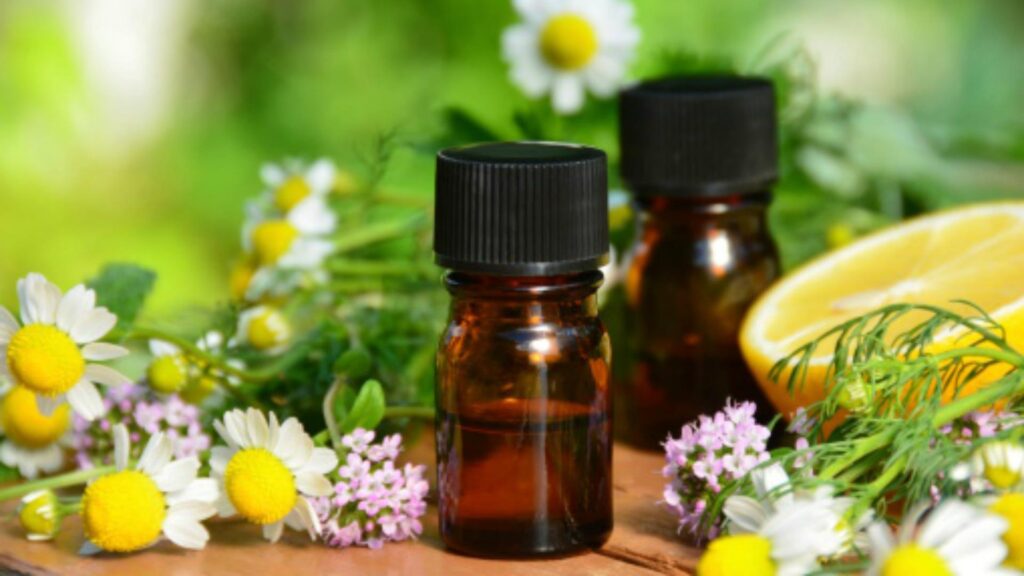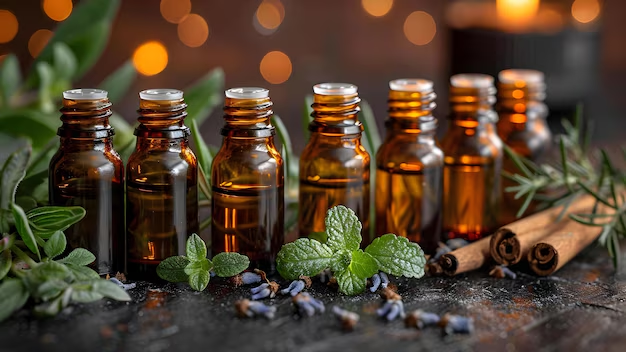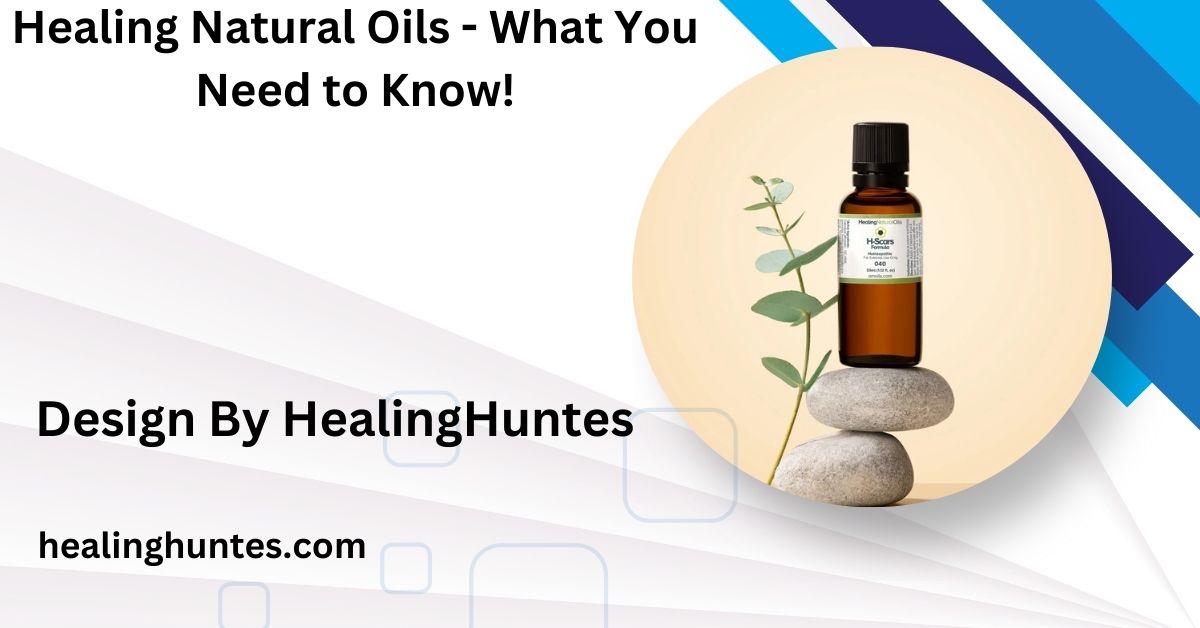Healing Natural Oils – What You Need to Know!
Healing natural oils like lavender, tea tree, and rosehip provide natural solutions for skincare, stress relief, and overall wellness.
In this article, we’ll explore the many facets of healing natural oils and how you can incorporate them into your daily routine.
The Basics of Healing Natural Oils:

Healing natural oils are extracted from plants, seeds, and fruits, offering concentrated nutrients and compounds. These oils are often used for therapeutic, cosmetic, and medicinal purposes.
Their healing properties make them a popular choice for those seeking natural remedies. Examples include essential oils like lavender and carrier oils like jojoba.
What Are Healing Natural Oils:
Healing natural oils are derived from various natural sources, rich in vitamins, antioxidants, and fatty acids. They are typically cold-pressed or steam-distilled to preserve their potency.
These oils are versatile, being used for skincare, haircare, and even aromatherapy, making them a staple in holistic health.
Types of Healing Natural Oils:
There are three main types of healing natural oils: essential oils, carrier oils, and infused oils. Essential oils are potent and aromatic, such as lavender and tea tree, known for their therapeutic properties. Carrier oils, like coconut or almond oil, are used to dilute essential oils and help moisturize the skin. Infused oils, made by soaking herbs like calendula in oils, provide soothing benefits for irritated skin.
Essential Oils:
Essential oils are highly concentrated plant extracts, known for their aromatic and healing properties. Popular choices like tea tree, lavender, and eucalyptus oils are often used in aromatherapy, skincare, and natural remedies. They must be diluted before topical use due to their potency.
Also Read: How To Heal A Scratched Eye – Symptoms and Treatment!
Carrier Oils:
Carrier oils are gentle, nourishing oils derived from seeds and nuts, such as almond, coconut, and avocado oils. They are primarily used to dilute essential oils, making them safe for skin application. Carrier oils also provide hydration and essential nutrients to the skin.
Infused Oils:
Infused oils are created by soaking herbs like calendula or chamomile in a base oil. This process extracts the therapeutic properties of the herbs, resulting in oils that are excellent for soothing irritated or sensitive skin. Infused oils are ideal for gentle skincare and massages.
Benefits of Healing Natural Oils:

Healing natural oils offer numerous benefits, including reducing inflammation, promoting skin regeneration, and relieving pain. They help moisturize and nourish the skin, improving its appearance and texture. These oils can also boost the immune system and help with stress relief through aromatherapy.
For Skincare:
Natural oils are effective in treating dryness, acne, and signs of aging. Their nutrient-rich composition restores skin balance and provides lasting hydration.
For example, rosehip oil is renowned for reducing scars and fine lines, while tea tree oil combats acne-causing bacteria.
For Stress Relief:
Certain oils like lavender and chamomile have calming properties that help reduce stress and anxiety. Aromatherapy with these oils can improve mood, enhance focus, and promote restful sleep.
For Pain and Inflammation:
Natural oils such as eucalyptus and peppermint are known for their anti-inflammatory properties. They can be applied topically to soothe muscle aches and joint pain.
Also Read: How to Heal a Cavity Without Fillings – What Actually Works!
How to Use Healing Natural Oils:
Healing natural oils can be applied directly to the skin, diluted with a carrier oil for safe use, or added to bathwater. They are effective for massages, aromatherapy, or topical treatments on specific areas. Always perform a patch test to check for allergies and follow usage instructions for each oil. Proper application enhances their benefits while minimizing any risks.
Topical Application:
Topical application of healing oils provides direct relief to the skin. Diluting essential oils with a carrier oil is crucial to avoid irritation. This method is effective for targeted skin care, soothing conditions like dryness or inflammation.
Aromatherapy:
Aromatherapy involves diffusing essential oils to create a calming atmosphere. This technique is excellent for managing stress, anxiety, and emotional well-being. Oils like lavender or chamomile can help promote relaxation and improve mood.
Adding to Baths:
Adding essential oils to your bath can enhance both relaxation and skin hydration. Oils such as eucalyptus or peppermint are ideal for clearing nasal congestion. This practice also helps soothe muscles and provides a refreshing experience.
Choosing the Right Oil for Your Needs:

Selecting the right healing oil depends on your specific needs. Whether it’s for skincare, stress relief, or pain management, there’s an oil for every purpose.
Popular Oils and Their Uses:
- Lavender: Ideal for stress relief and sleep enhancement.
- Tea Tree: Effective against acne and fungal infections.
- Argan: Rich in Vitamin E, perfect for moisturizing skin and hair.
Tips for Buying Quality Oils:
- Opt for organic and cold-pressed oils for maximum benefits.
- Look for reputable brands that provide purity certifications.
- Avoid oils with synthetic fragrances or additives.
Precautions and Safety Tips:
While healing natural oils are beneficial, it’s important to use them safely. Always do a patch test to check for allergies.
Dos and Don’ts:
- Do dilute essential oils before application.
- Don’t ingest oils unless directed by a professional.
- Do store oils in a cool, dark place to maintain potency.
Also Read: Will The Liver Heal Itself – Here’s What Science Says!
Incorporating Natural Oils into Your Daily Routine:
Healing natural oils can easily become a part of your daily wellness practices. Use them in your skincare, massage, or even cooking for added benefits.
Daily Skincare Routine:
Replace synthetic moisturizers with oils like jojoba or rosehip for a natural glow. Their lightweight texture absorbs quickly, leaving your skin smooth.
Wellness Practices:
Incorporate oils like lavender into meditation or yoga to enhance relaxation. A few drops on your pillow can also improve sleep quality.
FAQ’s
1. Are natural oils suitable for all skin types?
Yes, but choose oils based on your skin type. For example, jojoba suits oily skin, while almond oil is great for dry skin.
2. Can I use essential oils directly on the skin?
No, essential oils should always be diluted with a carrier oil to prevent irritation.
3. Which oils are best for reducing scars?
Rosehip and vitamin E oils are excellent for fading scars and promoting even skin tone.
4. How can I ensure the quality of natural oils?
Purchase from reputable brands and check for purity certifications. Avoid products with synthetic additives.
5. Can natural oils replace traditional medicine?
While beneficial, natural oils should complement, not replace, professional medical advice for serious conditions.
Conclusion
Healing natural oils are powerful, versatile remedies that cater to various skin, health, and wellness needs. From essential oils to carrier and infused oils, each type offers unique benefits for holistic healing. Incorporating these oils into your daily routine can enhance skincare, promote relaxation, and address specific health concerns. Always choose high-quality oils and use them appropriately to experience their full potential for natural healing.






